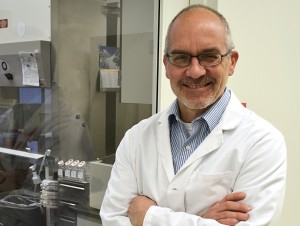
Today, the National Comprehensive Cancer Network (NCCN) announced an unprecedented collaborative breast cancer study in the Journal of National Comprehensive Cancer Network. On the DNAnexus Platform, C. Anthony Blau, MD, Director of the Center for Cancer Innovation and Professor of Medicine at University of Washington in Seattle implemented an innovative approach to clinical research and brought 32 researchers from 14 different institutions together to identify potential therapies for a patient with metastatic triple-negative breast cancer (TNBC).
Approximately one in five breast cancers are triple-negative. TNBC tend to be more aggressive, grow and spread more rapidly and are also less likely to respond to standard treatments.
The method used to study the TNBC patient, Intensive Trial of OMics in Cancer (ITOMIC), inversely differs from retrospective examinations of “exceptional responders” from conventional trials. Rather than evaluate a single intervention across hundreds of patients, ITOMIC aims to distribute the analysis of an individual cancer patient, predict drug susceptibilities, allow treatment in accordance to these predictions, monitor response and repeat…again and again. This creates a feedback loop to continuously learn and hopefully lead to the use of targeted therapies for complex patients in the future.
This study covers a single TNBC metastatic to bone patient, where tumor samples were monitored 48 times over a nine-month period. A team of researchers, led by Dr. Blau, performed exome sequencing, RNA-sequencing, and deep sequencing of a targeted gene panel. Data from these samples were shared on the cloud-based DNAnexus Platform. By providing a secure and centralized location 32 researchers located in disparate parts of the country were able to easily access and collaborate on the clinical data and provide medical predictions to what treatments might be effective against this specific type of cancer.
Quoted from the press release:
“On a molecular level, every cancer is unique,” said Dr. Blau, a UW Medicine researcher. “By breaking down institutional barriers, this collaborative study brings a ‘no-holds-barred’ effort to trying to help an individual cancer patient using tools that virtually unite experts from around the world.”
Added Dr. Blau:
“I’m not sure how much time this level of cooperation would have required had we not been able to utilize the DNAnexus Platform. Without it, 32 researchers would have been FedEx-ing hard drives back and forth cross-country. DNAnexus let everyone work from the same playbook; decreasing the time that we can complete our research and potentially save some lives.”
The ITOMIC method allows scientists to study rare tumor-associated variants of unknown significance, like ROS1 in this patient’s case. In more standard clinical trials researchers typically try to identify variants of known significance. By deep evaluation of a cancer patient over a distributed network of experts, multiple treatments/therapies can be used and observed, rather than in a standard clinical trial where only one treatment/therapy would be.
At DNAnexus we are proud to be the supporting this, and many other collaboration networks for groundbreaking research. We believe that accelerating the use of genomics information to advance cancer research requires novel approaches and are humbled to enable the work of researchers at the forefront of of precision medicine.

.png)
.png)
.png)